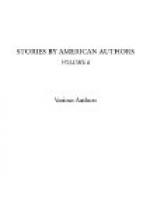“Come, come, father!” said Aunt Lyddy, “do give poor Ephraim a little peace. Why don’t you just say you thought they were oysters, and done with it?”
“Say I thought they was?” he replied, innocently. “I knew well enough they was—that is—knew? No, I didn’t know, but—”
Aunt Lyddy, with an air of mock resignation, gave up, while Joshua endeavored to fix, to a hair, the exact extent of his knowledge.
Eph smiled; but he remembered what would have made him pardon, a thousand times over, the old man’s garrulousness. He remembered who alone had never failed, once a year, to visit a certain prisoner, at the cost of a long and tiresome journey, and who had written to that homesick prisoner kind and cheering letters, and had sent him baskets of simple dainties for holidays.
Susan bustled about, and made a fire of crackling sticks, and began to roast the oysters in a way that made a most savory smell. She set the table, and then sat down at the melodeon, while she was waiting, and sang a hymn—for she was of a musical turn, and was one of the choir. Then she jumped up, and took out the steaming oysters, and they all sat down.
“Well, well, well!” said her father; “these be good! I didn’t s’pose you had any very good oysters in your bed, Ephraim. But there, now—I don’ s’pose I ought to have said that; that wasn’t very polite; but what I meant was—I didn’t s’pose you had any that was real good—though I don’ know but that I’ve said about the same thing, now. Well, anyway, these be splendid; they’re full as good as those cohogs we had t’other night.”
“Quahaugs!” said Susan. “The idea of comparing these oysters with quahaugs!”
“Well, well! that’s so!” said the father. “I didn’t say right, did I, when I said that? Of course, they ain’t no comparison—that is—no comparison—why, of course, they is a comparison between everything, but then, cohogs don’ really compare with oysters! That’s true!”
And then he paused to eat a few.
He was silent so long at this occupation that they all laughed.
“Well, well!” said he, laying down his fork, and smiling innocently; “what be you all laughin’ at? Not but what I allers like to hev folks laugh—but then—I didn’t see nothin’ to laugh at. Still perhaps, they was suthin’ to laugh at that I didn’t see; sometimes one man’ll be lookin’ down into his plate, all taken up with his vittles, and others that’s lookin’ around the room, may see the kittens frolickin’, or some such thing. ’Tain’t the fust time I’ve known all hands to laugh all to onct, when I didn’t see nothin’.”
Susan helped him again, and secured another brief respite.
“Ephraim,” said he, after awhile, “you ain’t skilled to cook oysters like this, I don’ believe. You ought to get married! I was sayin’ to Susan t’other day—well, now, mother, have I said an’thing out o’ the way?—well, I don’ s’pose ’twas just my place to hev said an’thing about gittin’ married, to Ephraim, seein’s—”




